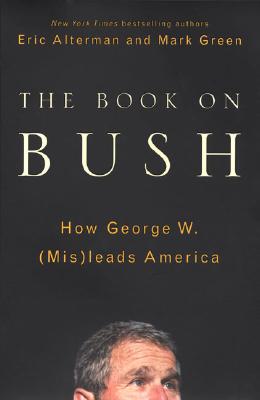

| THE BOOK ON BUSH How George W. (Mis)leads America Eric Alterman Mark Green New York: Viking, 2004 |
Rating: 5.0 High |
|||
| ISBN 0-670-03273-5 | 419p. | HC | $24.95 | |
Three years into his first term, George W. Bush (aka "W", aka "Dubya") faces a rising tide of questions over the quality of his administration. Eric Alterman writes a column for The Nation; Mark Green was New York City's elected Public Advocate and now heads the New Democracy Project. Both, I think, can fairly be described as liberals. Both have written other books on politics. Their current effort is one of the latest and most complete critical analyses of what George W. Bush has done during the course of his presidency. It is, in fact, a damning indictment in all the areas it covers (see the table of contents), lending great force to the conclusion that the Bush administration has raped the environment, ripped off the poor and middle class, and ravaged Iraq as a distraction... and for other purposes.
I found the book very hard to get through — not because it is unreadable, but because of the massive quantities of facts and details it contains, and because a great many of those facts made me want to smash something.
But are the facts presented here true? Are the interpretations valid?
In the main, the events Alterman and Green describe have been covered in mass-media news sources. To list a few of the major ones, it is beyond dispute that under Bush the federal deficit has ballooned, millions of jobs have been lost, evidence presented to justify the invasion of Iraq has turned out to be bogus, and American prestige abroad has tanked as a result. Less well known are such things as the actual results of Bush's "No Child Left Behind" policy, his tax cuts and other fiscal policies, and the degree to which religious ideology, cynical politics,1 neoconservatism, and personal vendettas have threatened foreign relations, domestic tranquility, and future progress.2
The authors have done thorough research; this is apparent from the text (and confirmed by 54 pages of fine-print notes.) They also take care to quote other voices in support of their observations — as in this example from pages 51-52:
Kent Conrad is an elected Democrat and, despite his reputation for sincerity and smarts, could be discounted as partisan. Not so the bipartisan Concord Coalition, which gave the Bush administration an F for a fiscal policy of "deficits, deception and denial." And not Washington Post columnist David Broder, the voice of the Washington political establishment. "I asked one of my favorite economics guides what he thought of the new Bush tax plan," he wrote. "This man—a veteran of the Nixon and Ford administrations and a friend and advisor to many officials in the Reagan and two Bush administrations said, 'it may be the least defensible policy ever.' " Professor George Akerlof, the 2001 winner of the Nobel Prize for economics, agreed. Complaining that the debate over Bush's economic policy "has been far too polite," Akerlof concluded that "the proper reference point is that the Bush fiscal policy is the worst in 200 years . . . what we have here is a form of looting." |
While I am no "policy wonk" (to use a term from the Clinton-Gore years), I am fairly well acquainted with current events. I detected no obvious untruths on the part of the authors. However, the book does have its defects. In addition to the normal amount of typographical errors to be expected in a book of this size, they come in two sorts: incomplete statements, and confusing wording. I list all such errors I noticed in the Errata page. These shortcomings are probably due to time pressure.3 With the caveat that they may not have gotten every story straight, I judge that Alterman and Green have done an essentially correct and honest account.4
It is also a very readable account, and one that avoids an excessively condemnatory tone. Yet it is not pleasant to read, because of what it reveals about the current occupant of the White House. The authors present far too much material for me to select any "list of lowlights", and I'll resist trying to come up with a "most egregious example", tempting as that is. Read the book if you have time before November. If you want the emotional equivalent of a punch in the gut, read Chapter 10, about the body blows America suffered on 11 September 2001 and the Bush team's responses. If you don't have time for anything else, read the conclusions (Chapter 13). This well-researched book contains important information touching on the choice of America's next president, and every American of voting age should at least sample it.
I will state my own conclusion on that impending choice, formed after reading the book, presented not in rancor but with conviction: George W. Bush has done a poor job and does not deserve re-election in November.

 To contact Chris Winter, send email to this address.
To contact Chris Winter, send email to this address.